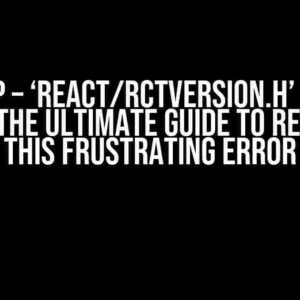Are you tired of wrestling with Tanstack React Query, only to find that the isLoading prop is stubbornly stuck on true for dependent queries on subsequent requests? You’re not alone! Many developers have stumbled upon this frustrating issue, but fear not, dear reader, for we’re about to embark on a journey to debug and conquer this problem once and for all.
The Basics of Tanstack React Query
Before we dive into the meat of the issue, let’s quickly review the fundamentals of Tanstack React Query. This fantastic library helps you manage data fetching and caching in your React applications. With React Query, you can easily handle asynchronous data fetching, caching, and error handling, making your app more efficient and user-friendly.
What are Dependent Queries?
In React Query, dependent queries are queries that rely on the result of another query. For instance, imagine you’re building an e-commerce app, and you need to fetch a user’s order history. The order history query depends on the user’s ID, which is retrieved from a separate query. In this scenario, the order history query is a dependent query.
The isLoading Conundrum
Now, let’s get to the heart of the problem. When you fire a dependent query, React Query should handle the isLoading prop correctly, right? Not always, it seems. Sometimes, isLoading remains true even after the dependent query has completed, causing frustration and hair-pulling (not recommended, by the way).
Why isLoading is Always True
So, what’s causing this issue? The culprit is usually a combination of factors, including:
- Incorrect query key configuration
- Improper use of the enabled option
- Missing or incorrect dependencies
- Cache invalidation issues
- Over-eager optimization
Debugging the Issue
To tackle this problem, you’ll need to perform some detective work. Let’s go through a step-by-step process to identify the root cause:
-
Check the query key configuration: Verify that you’ve provided a unique and correct query key for the dependent query. Ensure it’s not conflicting with other queries or cache entries.
import { useQuery } from 'react-query';const { data, isLoading } = useQuery(
['orderHistory', userId], // Correct query key
async () => {
const response = await fetchOrderHistory(userId);
return response.data;
}
);
-
Review the enabled option: Make sure you’re not accidentally disabling the dependent query by setting enabled to false.
import { useQuery } from 'react-query';const { data, isLoading } = useQuery(
['orderHistory', userId],
async () => {
const response = await fetchOrderHistory(userId);
return response.data;
},
{
enabled: true, // Correctly enabled
}
);
-
Verify dependencies: Double-check that you’ve correctly specified the dependencies for the dependent query. This might involve using the React Query DevTools to inspect the query’s dependencies.
import { useQuery } from 'react-query'; const { data: userData } = useQuery('user', async () => { const response = await fetchUser(); return response.data; }); const { data: orderData, isLoading } = useQuery( ['orderHistory', userData.id], // Correct dependency async () => { const response = await fetchOrderHistory(userData.id); return response.data; } ); -
Cache invalidation issues: Investigate whether cache invalidation is causing the problem. You might need to adjust your cache settings or use the invalidateQueries method to refresh the cache.
import { useQuery, invalidateQueries } from 'react-query';const { data: userData } = useQuery('user', async () => {
const response = await fetchUser();
return response.data;
});const { data: orderData, isLoading } = useQuery(
['orderHistory', userData.id],
async () => {
const response = await fetchOrderHistory(userData.id);
return response.data;
}
);// Invalidate the cache when the user data changes
invalidateQueries('orderHistory');
-
Over-eager optimization: Be cautious with over-optimization, as it can sometimes lead to isLoading being stuck on true. Review your optimization strategies and ensure they’re not interfering with the dependent query.
Solutions and Workarounds
If you’ve identified the cause of the issue, it’s time to implement a solution. Here are some common workarounds:
1. Use the `retry` Option
By setting retry to false, you can prevent the dependent query from retrying indefinitely, which might help resolve the isLoading issue.
import { useQuery } from 'react-query';
const { data: userData } = useQuery('user', async () => {
const response = await fetchUser();
return response.data;
});
const { data: orderData, isLoading } = useQuery(
['orderHistory', userData.id],
async () => {
const response = await fetchOrderHistory(userData.id);
return response.data;
},
{
retry: false, // Prevent infinite retries
}
);
2. Utilize the `staleTime` Option
Configuring staleTime can help React Query determine when to re-fetch the data, which might resolve the isLoading issue.
import { useQuery } from 'react-query';
const { data: userData } = useQuery('user', async () => {
const response = await fetchUser();
return response.data;
});
const { data: orderData, isLoading } = useQuery(
['orderHistory', userData.id],
async () => {
const response = await fetchOrderHistory(userData.id);
return response.data;
},
{
staleTime: 1000, // Adjust the stale time to suit your needs
}
);
3. Implement a Custom isLoading Handler
In some cases, you might need to create a custom isLoading handler to manage the loading state of your dependent query.
import { useQuery } from 'react-query';
const { data: userData } = useQuery('user', async () => {
const response = await fetchUser();
return response.data;
});
const [orderData, setOrderData] = useState(null);
const [isLoading, setIsLoading] = useState(false);
useEffect(() => {
async function fetchOrderHistory() {
setIsLoading(true);
try {
const response = await fetchOrderHistory(userData.id);
setOrderData(response.data);
} catch (error) {
console.error(error);
} finally {
setIsLoading(false);
}
}
if (userData) {
fetchOrderHistory();
}
}, [userData]);
// Use the custom isLoading state
if (isLoading) {
return
Loading...
;
} else {
return
;
}
Conclusion
Tanstack React Query’s isLoading prop can be a temperamental beast, especially when dealing with dependent queries on subsequent requests. However, by following the steps outlined in this article, you should be able to identify and resolve the issue. Remember to:
| Step | Description |
|---|---|
| 1 | Verify the query key configuration |
| 2 | Review the enabled option |
| 3 | Check dependencies and cache invalidation |
| 4 | Investigate over-eager optimization |
| 5 | Implement solutions and workarounds (retry, staleTime, custom isLoading handler) |
With patience, persistence, and the right tools, you’ll be able to tame the isLoading beast and create a seamless user experience for your React application.
Frequently Asked Question
Get ready to dive into the world of Tanstack React Query and explore the most common queries about isLoading being stuck on true for dependent queries on subsequent requests!
Why does my dependent query always show isLoading as true, even on subsequent requests?
This might be due to the way you’re using the `staleTime` option. If you set `staleTime` to a low value, React Query will consider the data stale very quickly, causing the dependent query to refetch and show isLoading as true. Try increasing the `staleTime` value or using the `refetchInterval` option to control the refetching behavior.
I’ve set up my dependent query with useQuery, but isLoading remains true even after the initial fetch. What’s going on?
Make sure you’re not accidentally re-creating the query key for the dependent query on each render. This can cause React Query to treat it as a new query, resulting in isLoading being true. Try using a memoized query key or a stable dependency array to ensure the query key remains the same between re-renders.
Is there a way to cancel the previous request when making a new request to the dependent query?
Yes, you can use the `retry` option with `retry: false` to cancel the previous request when making a new request. Additionally, you can use `UseQueryClient` to manually cancel the previous request using the `cancelQueries` method.
How can I debug why my dependent query is always showing isLoading as true?
Use the React Query Devtools to inspect the query’s state and logs. You can also enable the `debug` option in your React Query client to log more information about the query execution. This should help you identify the root cause of the issue.
Is it possible to simulate a dependent query that’s always loading for testing purposes?
Yes, you can use the `useQuery` option `select` to return a mock response that always shows isLoading as true. You can also use a mocking library like `msw` to simulate a slow or failed API response, allowing you to test your component’s behavior in different scenarios.





